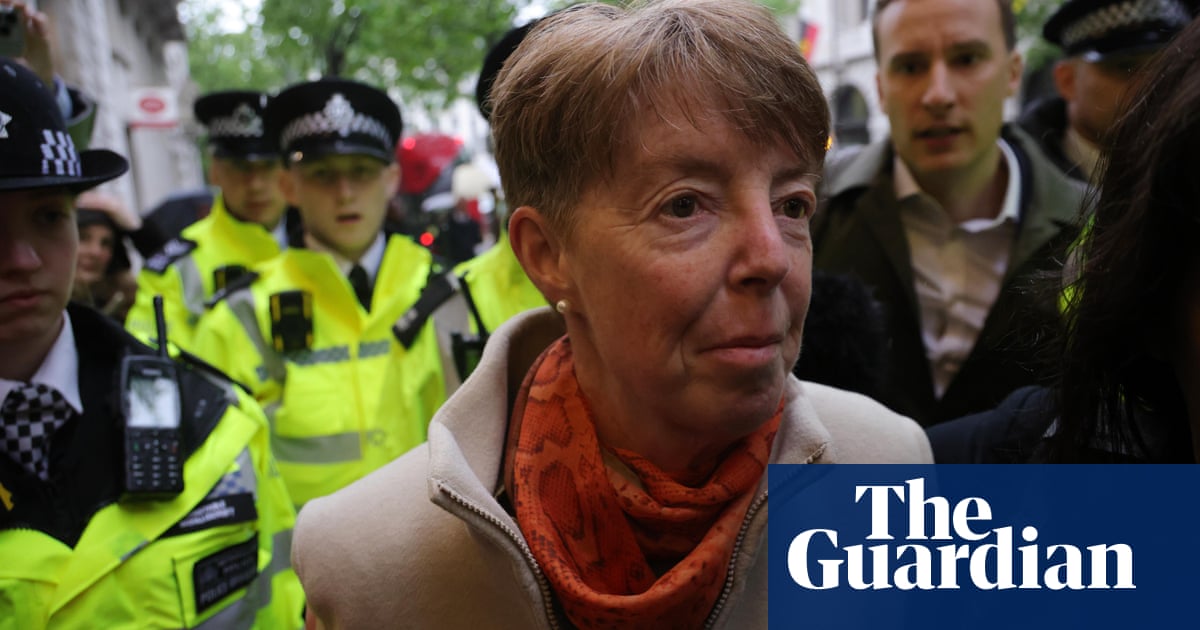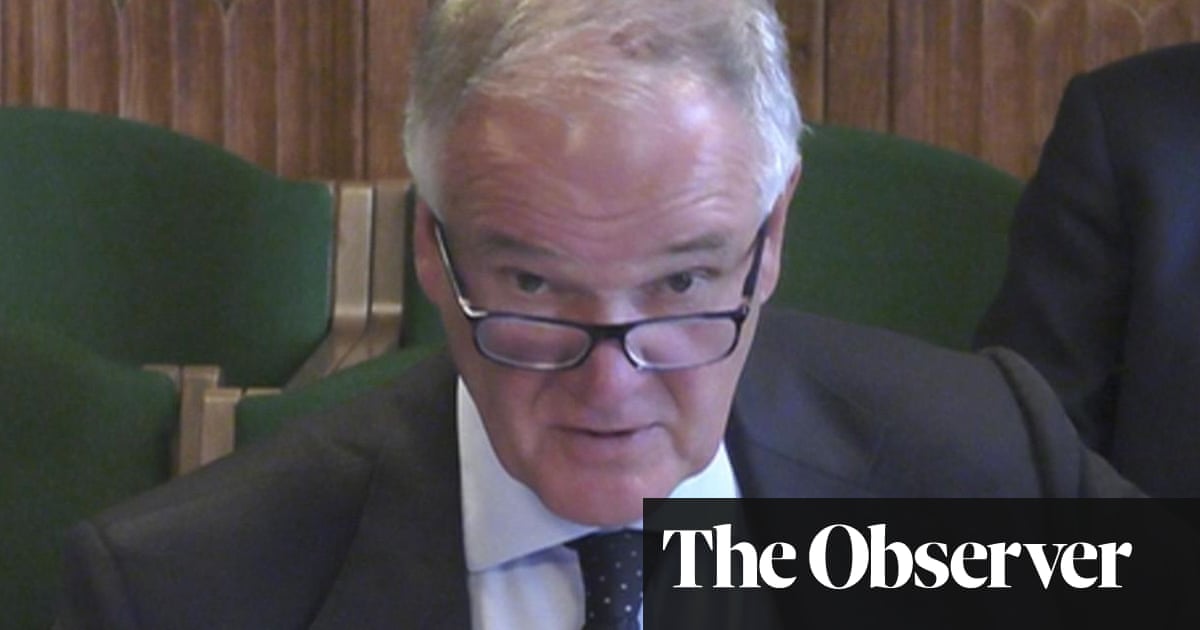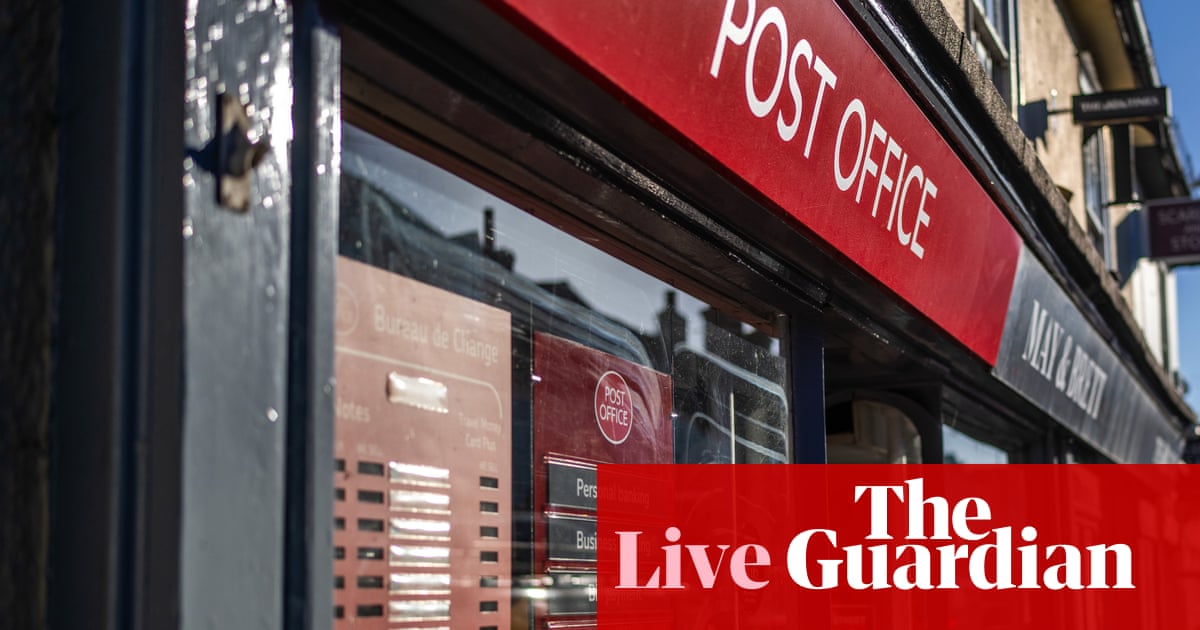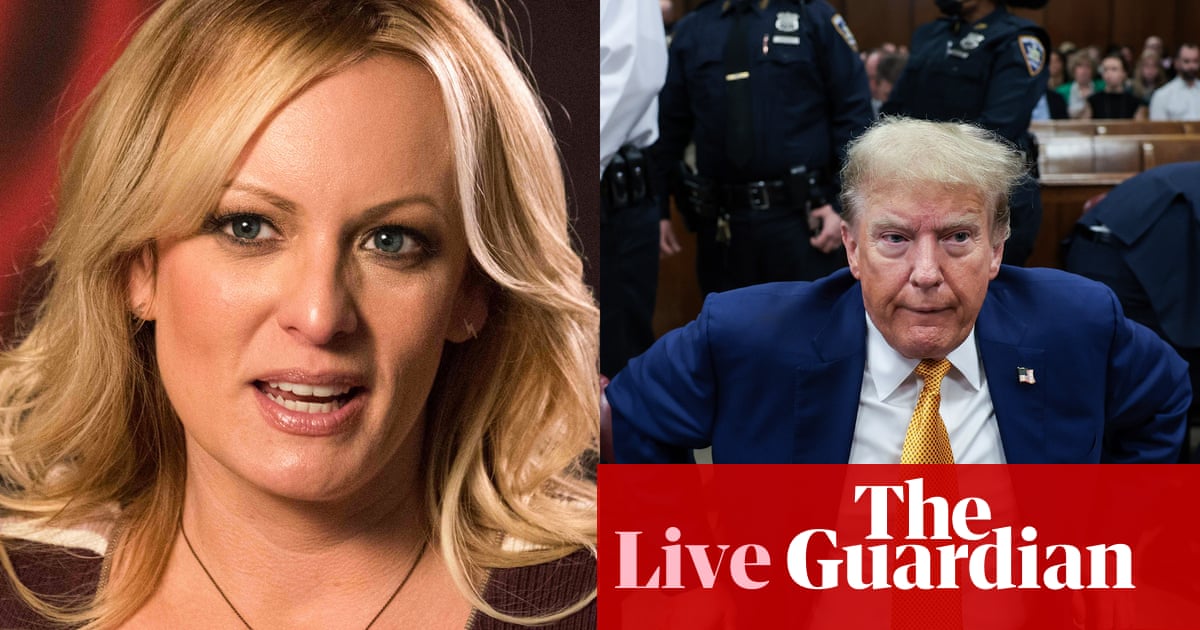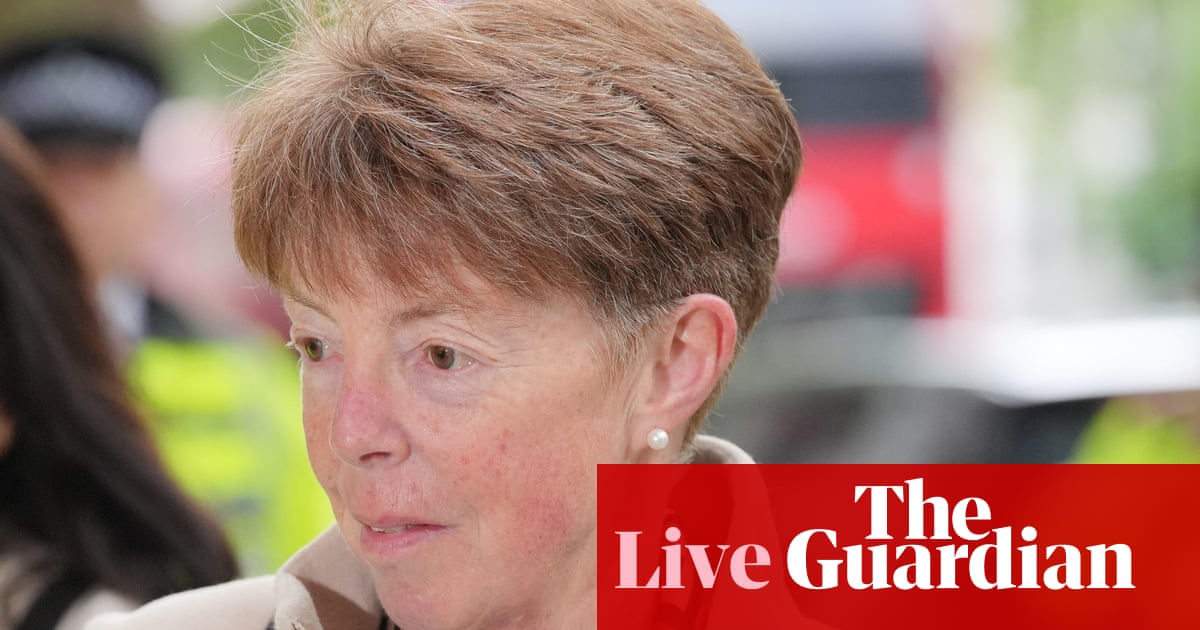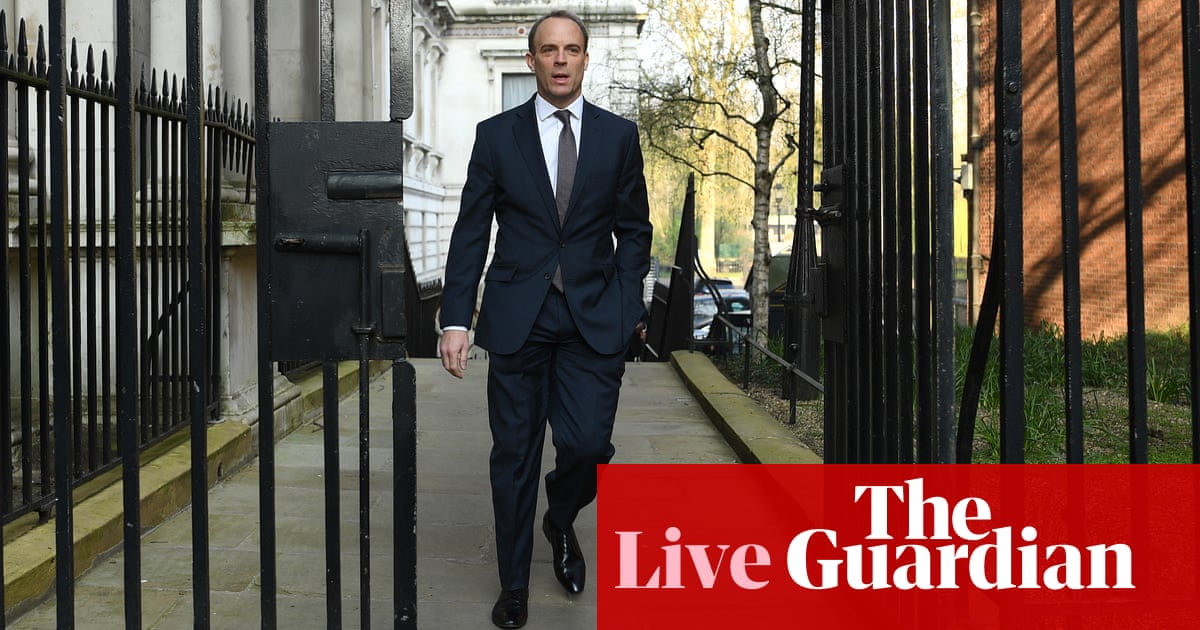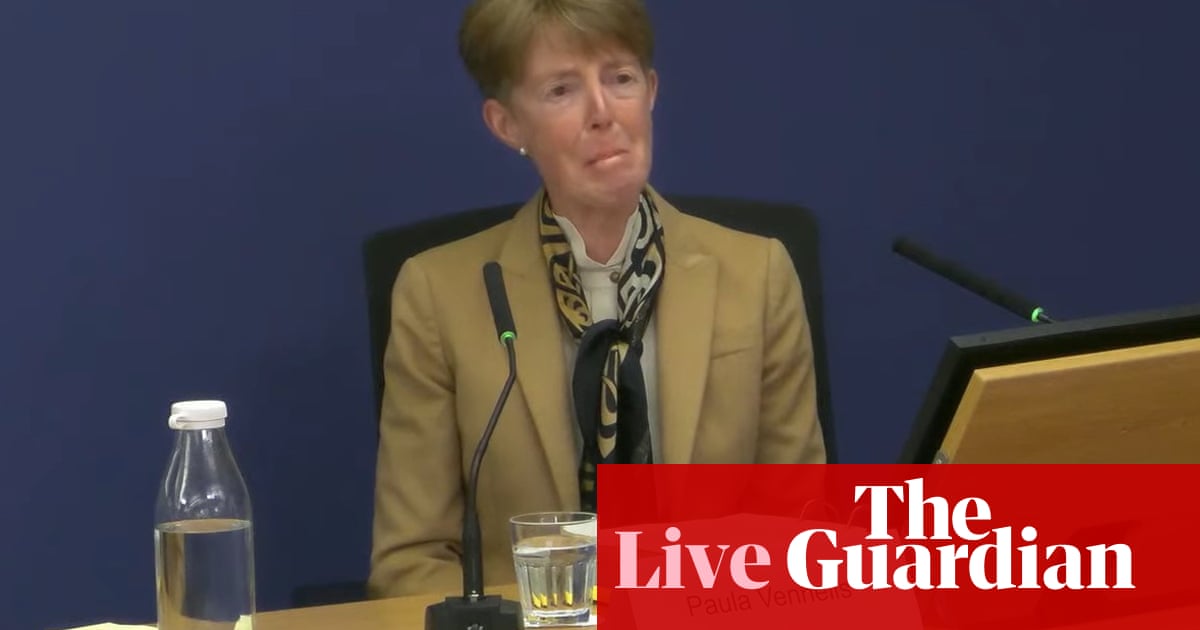
Vennells told her claim "I worked as hard as I could" to deliver "the best Post Office for the UK" is "absolute rubbish"
Paula Vennells has just given a long monologue in answer to a question by Sam Stein KC after appearing to sob having said “I loved the Post Office”.
She told the Post Office Horizon IT inquiry in London:
I worked as hard as I possibly could to deliver the best Post Office for the UK. It would have been wonderful to have 30,000 Post Office branches. That would have been the best outcome ever to have more post offices in more communities.
What I failed to do, and I have made this clear previously, is I did not recognise – and it has been discussed across the inquiry – the imbalance of power between the institution and the individual and I let these people down.
I’m very aware of that. And we should have had better governance in place. We should have had better data reporting in place that meant that we can see what was happening to individual postmasters and to the system. That was not the case.
I’ve worked as hard as I could and to the best of my ability. I know today how much wasn’t told to me. I now know information that I didn’t get. And I don’t know in some cases why it didn’t reach me. But my only motivation was for the best for the Post Office. And for the hundreds of postmasters that I met and I regret deeply what’s happened to these people.
“That’s absolute rubbish,” says Stein.
He tells Vennells that she and her “sidekick” Angela van den Bogerd “took on the group litigants in the High Court, fighting tooth and nail, allowing counsel on behalf of the Post Office to cross-examine the litigants on the basis that the losses were their fault, due to their incompetence or dishonesty. That’s what happened under your leadership.”
Paula Vennells finishes her testimony at the Post Office Horizon IT inquiry
That is the end of Paula Vennells’ appearance at the Post Office Horizon IT inquiry. Here are our reports from the three days …
Day one: Paula Vennells breaks down as she tells Post Office inquiry she was misled
Day two: Paula Vennells ruled out Post Office review that ‘would be front-page news’
Day three: Paula Vennells names five executives she blames over Post Office scandal
Here is the moment today Vennells gave a tearful reply to a question from Sam Stein KC on her final day of testimony, saying: “I loved the Post Office. I gave it … I worked as hard as I possibly could to deliver the best Post Office for the UK.” Stein responded at the end of her answer: “That’s absolute rubbish”
Thank you for reading. You can find our ongoing coverage of the scandal and inquiry here: Post Office Horizon scandal
Paula Vennells’ legal representative has no questions to put, and lead counsel to the inquiry Jason Beer KC says he has no questions to put arising from today’s proceedings.
Chair Wyn Williams says he is grateful to Vennells for her “extremely detailed witness statement and for giving evidence to the inquiry over three days” and that is the end of today’s hearing.
The inquiry adjourns, and will resume after a week’s break at noon on Monday 3 June to hear from Ben Foat, who has been group general counsel at the Post Office since May 2019.
Tim Moloney KC is now talking about a specific incident when head of communications Mark Davies responded on the BBC Radio 4 programme after a piece about the difficulty subpostmaster Jo Hamilton had faced after she was accused “I’m really sorry people have had to face lifestyle difficulties and lifestyle problems” minimising the suffering.
Paula Vennells says it was “extremely insensitive”, and Davies was forced to issue an apology. She says she would have never have used those kinds of words.
Moloney asks were the comments “not just reflective of the dismissive attitude, that post office had to campaigning postmasters at this time?”
Vennells says no, she did not lead a culture like this.
Moloney then pulls up an email from Vennells after she had seen an item about subpostmasters on the BBC’s One Show that same year in which she absolutely excoriates the participants, saying:
Hype and human interest. Not easy for me to be objective, but I was more bored than outraged. The MP quoted – who? – was full of bluster and inaccurate. Joe Hamilton lacked passion and admitted false accounting on TV. James Arbuthnot was nowhere to be seen, and the bulletin was too long.
The KC then pulls up an apology for this email from Vennells’ witness statement, and highlights the fact that she apologises for the “bored than outraged” comments not the personal attacks.
He asks the loaded question that you regret those remarks now, but did you regret those remarks on 18 December 2014, the day after you wrote them, or where they “triumphalist remarks” and “you regret them now because you’re here?”
Vennells attempt to completely defuse this by saying she completely agrees with him:
So I completely agree. I completely agree that the pressure we were under at the time to try to manage the what we genuinely felt was an imbalance of media coverage and representation about what was happening in the Post Office.
I have no excuse for what I wrote. Other than as I say I was under pressure and I think I was relieved that the programme hadn’t been perhaps as bad or as hard hitting as I’d expected it to be, and I’m just sorry. It was a terrible thing to write. There is simply no excuse. And it wouldn’t matter because we were wrong.
Moloney won’t let it go, and ties it back to his earlier line of questioning about legal privilege, saying to her was the real leadership example she set was that her staff were ordered not to write down anything they wouldn’t want to hear read out in court, and in this case “the mask slipped.”
As a measure of how difficult it is becoming to get answers out of Paula Vennells, she has just been asked by Tim Moloney KC the very straightforward question “Now in 2014, a degree of damaging publicity about concerns over the reliability of Horizon began to emerge.”
She replies “I’ll take your word for that. I’m sorry, I can’t recall the detail now.”
She is talking about a year after the publication of the Second Sight interim report, long after MPs have begun to get involved in cases, and five years after the Computer Weekly article about Lee Castleton first began to blow the whistle. He was just asking whether by 2014 there had been bad publicity about Horizon and she couldn’t give a straightforward answer.
Tim Moloney KC says he wants to move on to address the moment earlier in the inquiry when it was revealed that Paula Vennells had emailed the Post Office chair to say she had “earned her keep” by getting a reference to the Horizon IT system removed from the privatisation prospectus for Royal Mail.
She did not put anything about this in her nearly 800 pages of written witness statement. Earlier at the inquiry today she said she had “no involvement” in the prospectus about from that “late intervention” and didn’t remember anything much about it.
Moloney has just shown her that she listed it at the time as a key achievement in her yearly personal appraisal and review, which draws laughs from the public gallery.
This social media post from John Hyde, deputy news editor for Law Society Gazette, shows how people at the Post Office were changing the subject line of an email to attempt to bring it under legal privilege.
Paula Vennells had sent the email to the wrong person, and there is some debate about how angry her tone seems, and whether she had to backtrack because she thought she was sending it to someone she could regularly use a “domineering” tone to. Tim Moloney KC asks “has the mask slipped?”. She says no it hadn’t and that she didn’t operate that way.
Tim Moloney KC is asking about legal documentation from 2011 to do with a potential class action. Paula Vennells has pointed out she wasn’t CEO then, but was managing director, and that this was before the Royal Mail and Post Office split.
She is shown a document from 2011 by Emily Springford that says “It’s very important that we control the creation of documents which relate to any of the above issues” and goes on to say “Your staff should therefore think very carefully before committing to writing anything relating to the above issues.”
There is a lot of legalese essentially telling staff to go out of their way to make every document as likely as possible to be covered by privilege, meaning it would not have to be disclosed in court.
Vennells says she never saw this document. Moloney appears a bit flustered here as he doesn’t seem to be able to tie this document to Vennells, and she wasn’t in charge of the Post Office legal services when it was issued.
He is now asking her “as a person, not as a lawyer” what she thinks of the advice. She says the whole thing in the document is “odd”.
Moloney is arguing that the mantra in the document became standard practice in the Post Office and asks Vennells to comment on it.
But maybe Moloney has laid a trap here, because he is now showing an email chain where Paula Vennells in October 2011 was writing about a Horizon independent assessment and at one point she says “We have had lawyers advice re how mails etc are now handled”, suggesting she had read it.
Angela van den Bogerd, in her evidence to the inquiry, said that legal privilege was used to “cloak” messages.
Tim Moloney KC says he has three topics to tackle:
the importance of legal professional privilege to the Post Office
Paula Vennells’ involvement in the Royal Mail prospectus that Henry asked about this morning
some of the media coverage in 2014
Paula Vennells begins final session of evidence at Post Office Horizon IT inquiry
The inquiry has resumed after lunch, and Paula Vennells faces questions from Tim Moloney KC, who represents victims of the scandal. On Wednesday, the inquiry published her written witness statements, which run to nearly 800 pages and can be found here and here. This is the last session across the three days that she has been appearing this week. You can watch it here.
Before we resume for the afternoon, some reaction from Lee Castleton. He has told PA Media he wishes Paula Vennells would have recognised a decade ago that what happened to him and his Post Office colleagues was “unforgivable”.
“It’s a different world for me now. It’s 20 years on and we have had to fight so hard. I just wish she would have recognised that in 2013 – it would have made such a difference to a lot of people,” he said.
“It would have been so much better for everybody had the Post Office not done what they had done. There have been so many people punished for nothing.”
Castleton was found to have a £25,000 shortfall at his branch in 2004 and was made bankrupt after he lost his legal battle with the Post Office.
Post Office Horizon IT inquiry breaks for lunch
The inquiry has now broken for lunch and will resume at 2pm with an hour of questions from Tim Moloney KC, representing victims of the scandal.
There may be further questions from Paula Vennells’ own legal representative and from lead counsel to the inquiry Jason Beer KC after that, but only if required.
Paula Vennells is asked “How would you reconcile that despite your knowledge of issues with the reliability of Horizon evidence, criminal prosecutions based on such evidence continued in Scotland up until 2015?”
She replies that as far as she is aware those cases did not proceed on the basis of Horizon data alone, adding “I’m afraid my knowledge of the legal system in Scotland isn’t sufficient to be able to answer any more than about.”
She is informed that the Crown Office in Scotland has uncovered four cases prosecuted between 2013 and 2015 which relied on Horizon evidence.
Vennells then agrees that it has been “a very appropriate response” that the Post Office has been stripped of prosecuting powers in Scotland.
Catriona Watt on behalf of the National Federation of SubPostmasters, has asked Paula Vennells some quite technical questions about the “network transformation programme” programme.
Next up is Susan Sinclair’s legal team. Sinclair is a subpostmaster who was convicted in 2004 in Scotland, and the first to have successfully had their conviction quashed in Scotland.
The inquiry has previously established on multiple occasions that none of the senior leaders or senior legal team at the Post Office are conversant with Scots Law.
The Post Office also failed to disclose information about Horizon faults to courts in Scotland as well as in England, Wales and Northern Ireland.
I should add at this point that Alan Bates, one of the leading campaigners on this issue, had very little time for the National Federation of SubPostmasters (NFSP), and the feeling at times appeared to be mutual.
We saw yesterday an email from former head of the NFSP George Thompson in which he forwarded on a message from Bates to senior leadership in the Post Office, calling Bates’ words “rubbish” and saying that he would tell him to “go away”.
Catriona Watt mentioned this in her opening statement just now, pointing out that Thompson will be appearing at the inquiry and will have to “answer for the things he said and did” on behalf of the NFSP at the time. She said that email was “shocking and deplorable”.
In his oral testimony on 9 April, Bates said:
The NFSP was absolutely useless. I mean, they were just another department of Post Office, as I believe it still is these days as well.
If you go right back to the early days, the 2002s, 2003s, and when I was going to the NFSP meetings, I know I attended one meeting where a subpostmaster at the back of the meeting group, he started saying, “I’ve just had my post office taken off me and I’d had problems with Horizon”, and all the rest and the NFSP Exec people who were there escorted him out of the back of the place. They took him away, out of that meeting.
When my contract was terminated, I went to a NFSP meeting to try, well, a local branch one. I went to a NFSP meeting where I tried to speak on behalf of that, and there was one of the National Executive NFSP members at that meeting and he stopped … tried to stop me speaking. So there was an awful lot of pressure from the NFSP to support Post Office.
The inquiry has resumed with Catriona Watt asking questions on behalf of the National Federation of SubPostmasters (NFSP)
I mentioned earlier that Jane MacLeod, general counsel at the Post Office 2015-2019, named earlier as one of the people Paula Vennells said let her down [See 12.09 BST], is declining to cooperate with the inquiry in person.
Chair Wyn Williams has issued a statement, in which he says in part:
The inquiry sent MacLeod a request to produce a written witness statement. I was satisfied before seeing MacLeod’s draft witness statement that she would be an important witness from whom I wished to hear oral evidence. The inquiry wrote to MMacLeod to inform her that she was listed to give oral evidence.
MacLeod provided a draft of her witness statement on 11 April 2024. Her recognised legal representative informed the inquiry that, due to the passage of time, MacLeod considered that her written statement was the best evidence that she could offer and that she was “questioning … whether she would be able to assist the inquiry further”. The inquiry restated its position that it considered it important to hear oral evidence from MacLeod. Further, it offered to meet MacLeod’s travel and accommodation expenses. However, MacLeod has made it clear that she will not cooperate with the inquiry by providing oral evidence, whether by attending the inquiry in person or by giving evidence remotely via live video link.
The chair of the inquiry explains that while he does have some powers to summons her more forcefully, the chances of enforcement are negligible, and so the statement concludes
I … consider that there are no adequate means of compelling MacLeod to attend. However, I note that I have received a considerable amount of disclosure on the issues that are relevant to MacLeod. I shall be able to compare what MacLeod says in her witness statement alongside the extensive contemporaneous documentation I have received. Whilst it would have been greatly preferable to hear from MacLeod, I do not consider that her absence prevents me from establishing the facts of her involvement in the matters relevant to the terms of reference.
The inquiry is breaking and will resume at 12.35 for half-an-hour more before breaking for lunch. There is a three minute delay on the video stream.
Sam Stein KC has asked Paula Vennells why she did not do more to investigate what was happening when she first found out that subpostmasters were being forced to pay back large sums on money in 2013.
Vennells said she set up the mediation scheme “to look into every single one of those complaints.”
Stein, representing a number of subpostmasters, said: “You see a reasonable, caring CEO would have said, ‘I want answers. I want to know what’s going on. I want to find out about what’s happening to these people, the subpostamsters that are the lifeblood of the system’ … not set up some distance review.
“You didn’t do that did you?” he asked.
The former Post Office boss replied:
I think you will find those cases where I asked those sorts of questions, but where we were dealing with historic cases, they needed to go through a proper review process. You can’t just, as a chief executive, ask somebody for their opinion on something. You have to go into it in a huge amount of detail which is what I understood as happening and I regret that we did not deal with those cases as we should have done.




